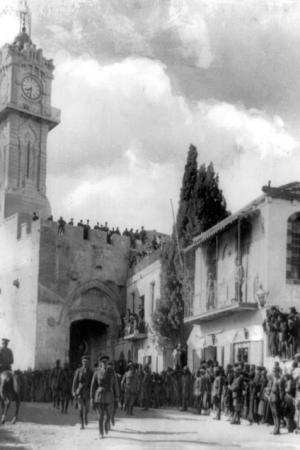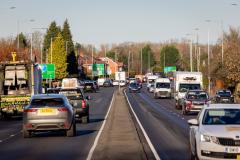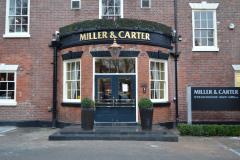
At long last there was some good news for Lloyd George in the terrible year of 1917. General Edmund Allenby entered Jerusalem, not in triumph, but respectfully on foot on 11 December. This ended 400 years of Ottoman rule. Allenby had been moving steadily north from Gaza and Beersheba over a month of fighting during the winter rains; his Egyptian Expeditionary Force included the 4th and 7th Cheshires accompanied by the ANZAC cavalry. Additionally they were supported by the Arab Revolt, which played havoc with the Turkish railways.
This mobile unit was admirably led by Feisal Ibn Hussein and Thomas Edward Lawrence (1880 - 1935). (This Welsh born archaeologist had been working on archaeological digs in the Middle East for years.) His knowledge of the local language and people led to his appointment as an intelligence officer to Feisal's guerrilla force. Later of course at the Paris Peace Conference, Lawrence felt that the Allies had ignored their promises of freedom to the Arab people - they placed much of the area under French and British mandate.
The local Cheshires suffered no fatalities in the desert this month, but as with the whole campaign they had to cope with searing heat, impassable desert roads, lack of water in summer and a range of infectious diseases (dysentery, malaria, yellow fever and typhoid). This winter campaign was waged in a sea of mud and mist with terrible effects on transport, especially the mules and camels. There was no shelter, the driving rain beat down mercilessly. By the 26th however, the Turkish opposition had melted away - their losses had been immense. Both sides were ordered to spare Jerusalem from fighting and bombardment given the number of Christian, Jewish and Muslim holy sites there.
Elsewhere was pretty quiet. Bad weather on the Western Front after Cambrai reduced all activity to the daily exchange of fire and consolidating defences. Armistice agreements on the Eastern Front were signed on the 15th at Brest-Litovsk. The 12th battle of the Isonzo ended with the Italians just about hanging on.
Mercifully there were no local battlefield casualties this month, but 2 men died at home.
Private Thomas Henry Brocklehurst of the Royal Army Service Corps Mechanical Transport (M/097823) died aged 23 on the 1st. He is buried in St Bart's graveyard and commemorated on the Alderley Edge memorial. He was the son of Sarah Ann, living in 1901 at 10 Duke Street, Alderley Edge with 2 brothers and 2 sisters. He was a telegraph messenger with the Post Office before the war. He enlisted in May 1915, going to France in the October. His brother Private John William Clarke Brocklehurst of the East Surreys had sadly died at Loos on 13 October 1915.
The RASC were affectionately known as "Ally Sloper's Cavalry" and were the unsung heroes of the conflict; it was their job to provide frontline troops with food, ammunition and equipment - a prodigious task using horses, motor vehicles and improvised railways. Thomas was invalided out of the army in July with pulmonary TB and honourably discharged. He was given a Silver War Badge to prevent public harassment by women, who took it upon themselves to give white feathers to those who appeared to be able-bodied men, whom they thought were guilty of cowardice.
Private James Cleary died aged 44 on the 23rd. He was born in Abbeyleix, County Kilkenny, Ireland and was a veteran of the Boer War. In 1911 he was working as a hod carrier and living with his wife and 4 children at 2 Raven Street, Pendleton, Salford. He re-enlisted in the Lancashire Fusiliers (20028) but was wounded and transferred to the Royal Defence Corps Garrison (303rd Protection Co. 20103) - soldiers who were too unfit for active duty, but who still wished to serve. They usually provided security on the Home Front. In late 1917 James was one of many guarding the perimeter of the Handforth PoW camp which held over 2,500 German prisoners. He was with a fellow soldier when he complained of dizziness. His friend left to report the matter, but when he returned he found James had been fatally shot. The coroner recorded a verdict of suicide. James is buried in Wilmslow Cemetery.
As the war entered its fourth Christmas season and as regimes and armies began to disintegrate, all belligerents must have wondered what 1918 would bring.
Jon Armstrong and Alan Cooper, Wilmslow Historical Society, with a contribution from Michael Scaife.
Photo: General Sir Edmund Allenby entering the Holy City of Jerusalem on foot 1917 to show respect for the holy place. (United States Library of Congress's Prints and Photographs division).









Comments
Here's what readers have had to say so far. Why not add your thoughts below.
Interestingly, after the Turkish Ottoman Rule of the City and country overall for 400 years, there is absolutely NO mention of "Palestine or a Palestinian State" in the report, it does mention Arabs who do live in a vast area of the middle east.
Canaan, Samaria, Judea, etc., are known biblical references to the land - but no Palestine.
*However, it is noted that the Arab faiths claim many " holy centres of their faith" - Mecca, Medina, Jerusalem etc.,
He described the Turkish soldiers as fearless and only referred to humourous events that occurred.
Shalom upon Jerusalem, Canaan, Samaria, Judea and all Israel.